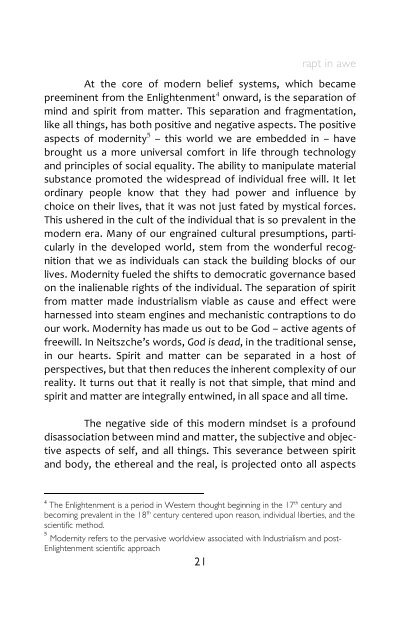rapt in awe - Get a Free Blog
rapt in awe - Get a Free Blog
rapt in awe - Get a Free Blog
Create successful ePaper yourself
Turn your PDF publications into a flip-book with our unique Google optimized e-Paper software.
21<br />
<strong>rapt</strong> <strong>in</strong> <strong>awe</strong><br />
At the core of modern belief systems, which became<br />
preem<strong>in</strong>ent from the Enlightenment 4 onward, is the separation of<br />
m<strong>in</strong>d and spirit from matter. This separation and fragmentation,<br />
like all th<strong>in</strong>gs, has both positive and negative aspects. The positive<br />
aspects of modernity 5 – this world we are embedded <strong>in</strong> – have<br />
brought us a more universal comfort <strong>in</strong> life through technology<br />
and pr<strong>in</strong>ciples of social equality. The ability to manipulate material<br />
substance promoted the widespread of <strong>in</strong>dividual free will. It let<br />
ord<strong>in</strong>ary people know that they had power and <strong>in</strong>fluence by<br />
choice on their lives, that it was not just fated by mystical forces.<br />
This ushered <strong>in</strong> the cult of the <strong>in</strong>dividual that is so prevalent <strong>in</strong> the<br />
modern era. Many of our engra<strong>in</strong>ed cultural presumptions, parti-‐<br />
cularly <strong>in</strong> the developed world, stem from the wonderful recog-‐<br />
nition that we as <strong>in</strong>dividuals can stack the build<strong>in</strong>g blocks of our<br />
lives. Modernity fueled the shifts to democratic governance based<br />
on the <strong>in</strong>alienable rights of the <strong>in</strong>dividual. The separation of spirit<br />
from matter made <strong>in</strong>dustrialism viable as cause and effect were<br />
harnessed <strong>in</strong>to steam eng<strong>in</strong>es and mechanistic cont<strong>rapt</strong>ions to do<br />
our work. Modernity has made us out to be God – active agents of<br />
freewill. In Neitszche’s words, God is dead, <strong>in</strong> the traditional sense,<br />
<strong>in</strong> our hearts. Spirit and matter can be separated <strong>in</strong> a host of<br />
perspectives, but that then reduces the <strong>in</strong>herent complexity of our<br />
reality. It turns out that it really is not that simple, that m<strong>in</strong>d and<br />
spirit and matter are <strong>in</strong>tegrally entw<strong>in</strong>ed, <strong>in</strong> all space and all time.<br />
The negative side of this modern m<strong>in</strong>dset is a profound<br />
disassociation between m<strong>in</strong>d and matter, the subjective and objec-‐<br />
tive aspects of self, and all th<strong>in</strong>gs. This severance between spirit<br />
and body, the ethereal and the real, is projected onto all aspects<br />
4 The Enlightenment is a period <strong>in</strong> Western thought beg<strong>in</strong>n<strong>in</strong>g <strong>in</strong> the 17 th century and<br />
becom<strong>in</strong>g prevalent <strong>in</strong> the 18 th century centered upon reason, <strong>in</strong>dividual liberties, and the<br />
scientific method.<br />
5<br />
Modernity refers to the pervasive worldview associated with Industrialism and post-<br />
Enlightenment scientific approach


